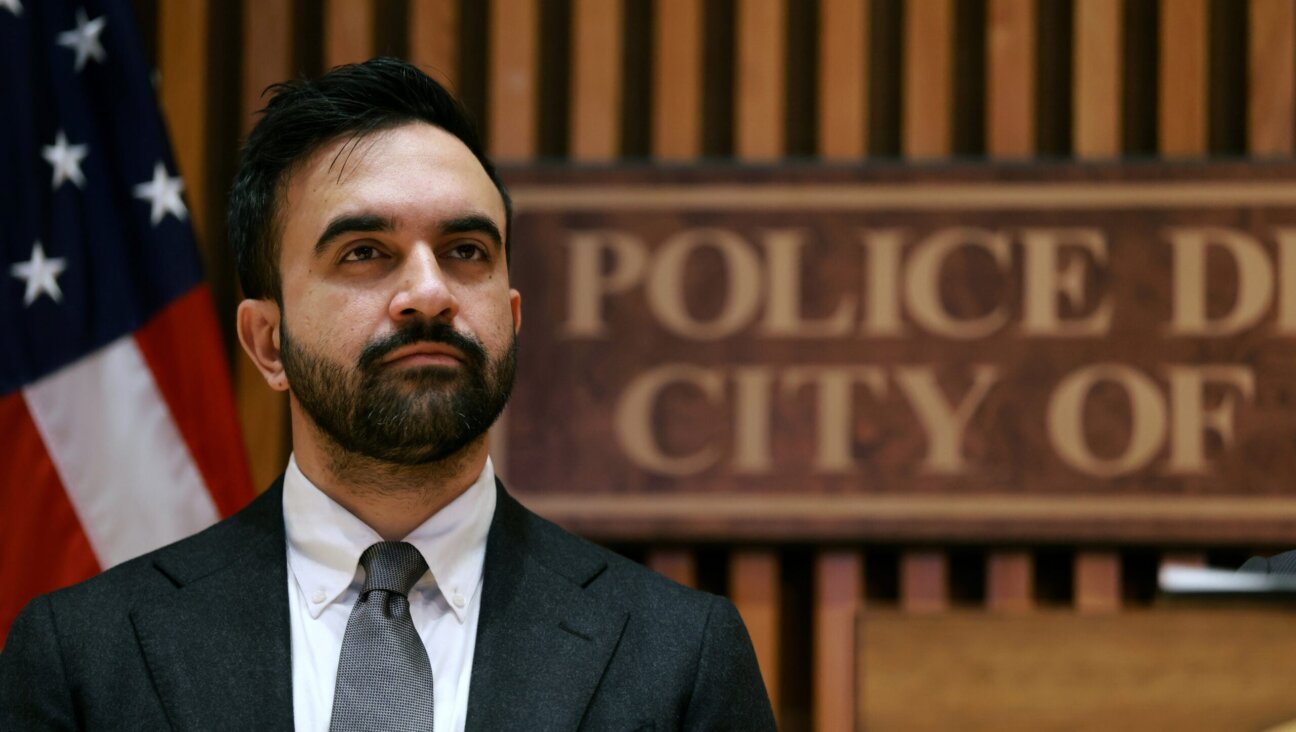Bintel Brief: Rabbi Irwin Kula on Israel and the Dilemmas of Jewish Power
Hello Rabbi,
I am a convert to Judaism, or Jew-by-choice. Many elements contributed to my decision to join a synagogue and go to the mikveh.
Of course, my wife, her family, our children together and the rabbis I’ve learned from are significant drivers of my decision. Our commitment to family and community, our faith in the oneness of God, our value of learning and our pursuit of justice are Jewish values I embrace.
My decision to convert was also driven by the role played by the Jewish people in history. Since the destruction of Herod’s temple, Jews sought peace with our neighbors and had not resorted to violence or oppression to validate the existence of our culture and people. Not until today.
I am struggling with my confidence in my ability to balance the Jewish teachings of the value of all human life and the requirement to treat the stranger equally because we were slaves in Egypt with reports of the cruel treatment of Palestinian people by Israeli soldiers and settlers. How can a people free from the ghetto and concentration camp resort to creating similar institutions for people whose crime is they occupy land needed for the security of Greater Israel?
I do not hold the Palestinians as blameless. They are guilty of crimes of violence and terror, but the Israeli response is seen as an overreaction by many reasonable people. It is reported that Israel pursues economic strategies that keep Palestinians from developing an economic environment that would reduce their willingness to pursue violent liberation.
My reading indicates that it is very easy to place blame on all sides of this conflict. Victims are villains and vice versa, but why shouldn’t I expect the Jewish state to pull itself out of this cycle of revenge and show itself to be the light the Torah expects?
Because of the Shoah, a safe Jewish homeland must exist. But can it continue to exist with this perception of violent oppressor and injustice?
Simply put, can one be opposed to Israeli policies and be Jewish or philosemitic?
VEXED BY VIOLENCE
Rabbi Irwin Kula replies:
Welcome to the tribe! We need you. Your question and the sensitivity and integrity with which you share your anxiousness about the state of Israel is a magnificent testimony to how deeply part of the Jewish people you feel and to the depth, sincerity and excellence of your conversion process. Being a serious Jew in the 21st century means wrestling with precisely the moral questions you have raised — whatever particular political positions one may have.
So let me offer some context for your questioning, not to provide you with easy answers to the Israeli-Palestinian issue — there are none — but to intensify and give texture to your questioning. After all, the Torah does not primarily give neat answers to serious questions; rather, more often than not, studying Torah surfaces even deeper questions than the ones with which we start, questions that illuminate new truths about ourselves and evoke in us greater capacity for compassion. As long as we are seriously asking the difficult questions, we are pretty much assured that we are on the right path.
While I very much understand your appreciation for Jews not resorting to violence for much of the past 2,000 years, it is important to realize that it may well be that the primary reason we did not resort to violence was less some superior ethical stance and more simply the fact that we actually did not have the power or ability to resort to violence for much of that period. Not being permitted to have guns or knowing that our resorting to violence would immediately result in destruction probably had a lot more to do with our not using violence than some superior ethic of nonviolence.
One of the great transformations that Zionism ushered in and that the Holocaust demanded was that Jews take and exercise power, in all the ways that non-Jews exercised power, in defense and in pursuit of our national aims. This was heresy (see the Talmud tractate Ketubot 110a where assuming power is specifically prohibited) and made Zionism one of the greatest revolutionary movements in the history of the Jewish people. All of a sudden, there was a new truth about Jews (aside from small groups like Neturei Karta, by 1948 this included the vast majority of Jews), especially Israeli Jews, that both Jews and non-Jews needed to assimilate. Jews would indeed use violence to secure and defend themselves. This has been shocking to many liberal Christians who are far more comfortable with morally pure, powerless Jews. And this has been unnerving to liberal Jews whose Jewish self-image as nonviolent and morally superior makes almost any use of power morally suspect. And this has been intoxicating for right-wing Jews for whom the memory of the Holocaust and return to the land after 2,000 years makes almost any use of this newly assumed power morally justifiable.
So, with this new reality come brand new sorts of questions and moral complexity, as one of the truths about power is that power corrupts. The Jewish people, as a whole, decided that this inevitable corruption and abuse that comes with the exercise of power was a price worth paying, as the other truth we learned, by the middle of the 20th century, was that powerlessness equals death. This shift from “powerlessness” to “power” (and I am specifically emphasizing military power) requires new sorts of emotional responses and moral and ethical questions. The moral purity that comes with powerlessness (it is amazing how when one does not have weapons how few people one shoots either on purpose or accidentally) is no longer available when one decides to exercise power. This means that moral discomfort and moral ambiguity are, particularly if one is a morally sensitive person, permanent qualities of consciousness. This uneasiness takes some getting use to so as to be able to both exercise power when necessary and critique the use of power when appropriate. One needs to appreciate and even become “comfortable” with this new permanent state of moral ambiguity, learn that it is part and parcel of an ethic of power, and use it to engage in constructive self-critique. For some this state of moral ambiguity is too painful to tolerate and they lapse into morally self-righteous all-encompassing critiques of almost any use of power. (These are the Israel-is-always-wrong folks.) For others, the distress of moral ambiguity is too painful, and they repress the discomfort, disassociate from any moral uncertainty and lapse into morally self-righteous justification for any exercise of Israeli power. (These are the Israel-is-always-right folks.) And then there are those of us who try as best we can to wrestle in an ongoing way with judging between the legitimate uses of power and the inevitable abuses of power — a line that is contextual, contingent and should always be contested.
In other words, when you are wrestling with Israel’s use of power in relation to Palestinians, it is critical to be on the lookout for the pitfall of idealization. One sort of idealization is the idealizing of us Jews as morally pure and superior. This inevitably leads to profound disappointment and even despair, and more often than not to a critique of Israel that is far too harsh and that says more about the criticizer than the criticized. The other sort of idealization is the idealizing of Israel as always justified in any use of power — this often comes with reference to the Holocaust and being all alone in the world fighting a contemporary evil enemy that wants to destroy us. As long as your questions and discomfort regarding Israel honestly take into account these tendencies, then you are right where you are supposed to be and I urge you to participate in debating and discussing the most important issue facing the Jewish people. I urge you to read the news out of Israel, where the debate is incredibly vibrant and serious and where you will find people voicing the same concerns you have. Get involved; make your voice heard both there and here. It is your right and responsibility as a Jew.
One word of caution: Every community has its political third rails. Just like social security is the third rail of American politics, Israel is the third rail of American Jewish communal life. For reasons too complicated to go into in this letter, any critique of Israel will be met with very serious condemnation by the vast majority of the American Jewish institutional leadership. Remember, the motivation of those who will fiercely oppose you is good, and fierceness in attacking is always a reflection of the fear of a truth, on the other side, that is pricking one’s consciousness. Obviously, this also goes for how you hold yourself in wrestling with this very complex and difficult issue.
Rabbi Irwin Kula is president of CLAL-The National Jewish Center for Learning and Leadership. He is the author, most recently, of “Yearnings: Embracing the Sacred Messiness of Life” (Hyperion, 2006) and was featured in the public television special “The Hidden Wisdom of Our Yearnings,” which was based on his book.
















